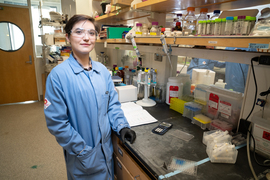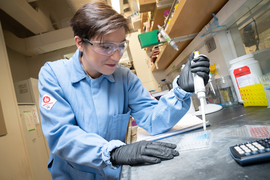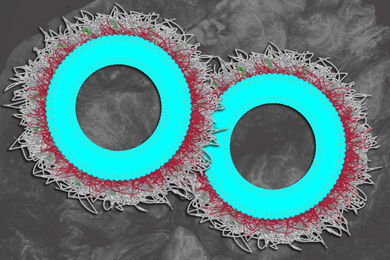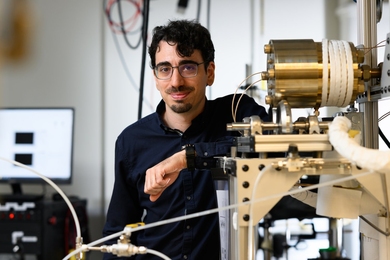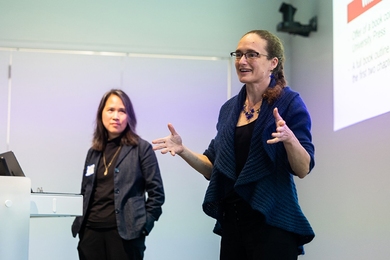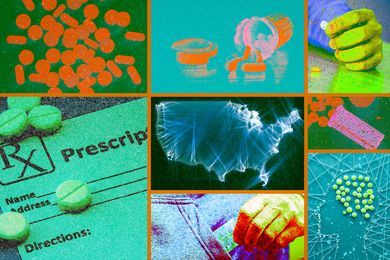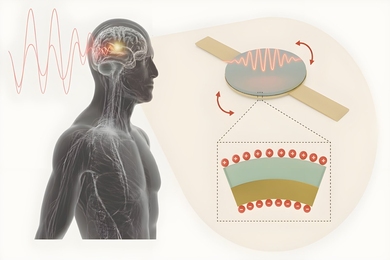Charlie Farquhar entered college intending to major in history, but quickly pivoted after taking an introductory chemistry course and becoming fascinated by chemistry’s biomedical applications.
“I’m interested in how these small chemicals and molecular interactions can make really large-scale changes in the body,” says Farquhar, noting that the practice of chemistry itself is similar. As a scientist, “I can be a part of that signaling cascade that makes system-wide change,” they add.
Now a fifth-year graduate student in the lab of chemistry professor Bradley Pentelute, Farquhar’s research focuses on targeted drug delivery, to ensure drugs are affecting the intended location within the body.
In one of their two main projects, Farquhar is developing a peptide that binds to a protein over-expressed in brain tumor cells. The peptide is also designed to enter the cells to deliver a chemotherapy drug to the tumor, helping to decrease side effects from off-target interactions and lower cost by requiring less of the drug for an effective treatment.
The second project operates with a similar principle but aims to improve treatment for muscular dystrophy. The Pentelute Lab is working with a Cambridge, Massachusetts, company that has developed the only FDA-approved treatment for muscular dystrophy, but the treatment currently requires frequent high dosages to be effective. By developing a targeting peptide that binds and enters muscle cells, the project aims to reduce wasted product and save cost.
Farquhar was drawn to these projects because of their tangible impacts on human health. They also apply this ethos outside of their lab work. Farquhar is passionate about equal access to education and has spearheaded several initiatives within the chemistry department in pursuit of this goal.
As a teaching assistant for undergraduate chemistry courses, Farquhar relished the opportunity for direct mentorship with their students and the relationships they formed. Their ability to connect with their students earned them a departmental teaching award as a first-year graduate student in 2019.
Farquhar also applies that mentality to the Pentelute Lab, fondly describing their “small army of children” — the group of junior graduate students they have trained on different instruments or lent a helpful ear to talk through project ideas.
“I especially love the people,” Farquhar says of their labmates. “Even when the science isn’t going well, l still look forward to going to work every day because I love everyone in my lab. And I’ve put a lot of work into making sure the lab has a good and healthy culture.”
The same applies to their work within the Department of Chemistry. Farquhar is currently the president of the Chemistry Alliance of Diversity and Inclusion, and an active member of the Chemistry Graduate Student Committee and Women+ in Chemistry groups. Alongside classmates, they have organized programming for #ShutDownChem, derived from the #ShutDownSTEM movement, every June since 2020.
“Everyone should be responsible for things like participating in DEI and working toward greater equality and inclusion,” says Farquhar. “We sometimes put an undue burden on students from underrepresented groups in terms of what we’re actually asking them to do. We should all share in this work, and then it’s not a burden at all.”
Farquhar says they’re most proud of the work they’ve done encouraging future members of the department, both graduate students and faculty members. They helped start a program to provide mentorship during the graduate student application process, guidance they wish they’d had during their own experience applying. Farquhar was also involved in organizing the Future Faculty in Chemistry Symposium, which invites postdocs to give a talk at MIT and participate in workshops with current faculty members to strengthen their job applications. The symposium specifically recruits postdocs from underrepresented groups and those who’ve put a lot of time into diversity, equity, and inclusion efforts alongside their career.
“We’re trying to help boost these people when they’re applying for faculty jobs around the country,” says Farquhar. “We’re boosting the applications of people who have put a lot of time and thought and effort into DEI, which are both the kind of professors we’d like to hire in the future and the kind of people who should be acknowledged.”
After finishing their program, Farquhar plans to continue with drug delivery research in the hopes of bringing down costs for consumers. For now, they’re focused on enjoying their current work and the people it allows them to interact with.
“One of my favorite things about research in my lab in particular is collaboration,” says Farquhar. “Having the opportunity to work with other scientists, especially internationally, I think that’s been something really fun about doing science. Whether it’s mentorship or just running a small part of somebody else’s larger paper, it’s very cool to be part of this system that all works together.”
